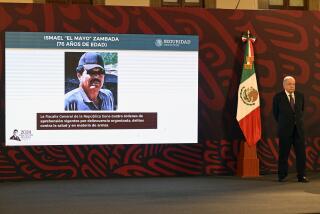Hasenfus Says CIA Supervised Flights : Many Who Aid Contras Linked to Spy Agency
- Share via
WASHINGTON — As the Reagan Administration on Thursday repeated its denials of any involvement with an American-manned cargo plane shot down in Nicaragua, evidence mounted that many of the people involved in the contras resupply operation have worked on CIA projects in the past.
The chairmen of the House and Senate Intelligence Committees said they believe the CIA’s denials.
In addition, Assistant Secretary of State Elliott Abrams said that statements of the sole surviving crewman, captured American Eugene Hasenfus, should not be taken seriously while he is in the hands of the Nicaraguan regime. Hasenfus said Thursday that two CIA officers had directed the operation to resupply Nicaraguan rebels.
Questions Revived
Nevertheless, increasing references to the CIA resulting from inquiries into the backgrounds of those involved in the ill-fated mission earlier this week have revived questions of whether the agency had an informal connection with the flight.
For example, The Times learned Thursday that William J. Cooper, the Nevada aviator who piloted the ill-fated cargo plane, and who appears to have played a key role in organizing the flight, was once one of the CIA’s chief pilots in Southeast Asia. (Story, Page 8.)
Congress has barred the CIA from aiding the contras since 1984. Both chambers have approved a new program of $100 million in CIA-administered aid for the rebels, but it has not yet reached final passage.
Hasenfus, who spoke to reporters at a government press conference in Managua, said the resupply operation was based at the headquarters of El Salvador’s air force, Ilopango base, and was run by two CIA men whom he identified as Max Gomez and Ramon Medina.
Retired Maj. Gen. John K. Singlaub, a former CIA officer who is one of the contras’ most vocal supporters, told reporters in Washington that Gomez is a former CIA employee who now works as an adviser to the Salvadoran air force.
“It’s my understanding that at one time he was employed by CIA,” Singlaub said, “perhaps during the Bay of Pigs operation”--the 1961 invasion of Cuba sponsored by the CIA.
Both Cooper and Hasenfus once worked for Air America, the CIA-owned airline that ran clandestine operations in Indochina until 1975, according to Hasenfus.
‘Stay in Touch’
“These guys all stay in touch with each other,” an aide to the Senate Intelligence Committee said. “You may even find a guy who’s still with the agency who was hanging out with his buddies and might have gone on one of these flights. But, if he did, it was in clear violation of CIA policy.”
“There is a large group of unemployed or underemployed pilots who have airplanes and are vying for hauling jobs in Central America,” Singlaub said. “Business is not good. I hope it’ll be better once the $100 million is passed.”
CIA spokeswoman Kathy Pherson said, “We didn’t have anything to do with the guy (Hasenfus). We didn’t have anything to do with the plane. And we can say that, instead of our usual ‘No comment,’ because a plane that flies in and drops supplies would violate congressional restrictions. We have not and will not violate congressional restrictions.”
‘Prison for 30 Years’
Abrams told the Associated Press that he believes Hasenfus was pressured by his Sandinista captors into making his charges of CIA involvement.
“I’m confident they are telling him if you say the things we want to hear, you’ll be out in no time,” he said. “If you don’t cooperate, you’ll be in prison for 30 years.”
Rep. Lee H. Hamilton (D-Ind.), chairman of the House Intelligence Committee and a leading opponent of U.S. aid to the contras, said he does not believe that the CIA was involved.
“I don’t think the four men were CIA. I don’t think the plane was a CIA asset. I don’t think it was a CIA operation,” Hamilton said. “It is my impression that the CIA has not violated the law.”
Sen. Dave Durenberger (R-Minn.), chairman of the Senate Intelligence Committee, said he is “fairly confident that the CIA has been trying to keep its hands clean” as long as a congressional ban on aid to the contras remains in force.
“But somebody in the United States government knows who these people are,” he added, disputing Administration spokesmen’s insistence that they do not even know who was behind the supply flights.
Despite Durenberger’s measured expression of confidence in the CIA, a spokesman for the committee said it is checking the 34 American-sounding names that the Sandinistas say they found in the airplane’s records to see if any have been employed by the CIA.
And not all members of Congress were equally convinced.
“That plane doesn’t take off with what it took off with without the CIA knowing about it,” said Rep. Michael D. Barnes (D-Md.), chairman of the House Foreign Affairs subcommittee on Latin America and a frequent critic of American policy in Central America. “An independent operation wouldn’t be operating out of Ilopango. Nothing happens there that we don’t approve.”
The CIA has assured the Senate committee that it is not funding the contras indirectly, through allied countries or other intermediaries, an aide said.
Several contras officials have said that the five rebel airplanes based at Ilopango were bought with the help of donations from Saudi Arabia. The Senate Intelligence Committee aide said Thursday that the CIA has said flatly that the Saudi government is not funding the contras.
More to Read
Sign up for Essential California
The most important California stories and recommendations in your inbox every morning.
You may occasionally receive promotional content from the Los Angeles Times.














